RMIT Nursing: Recovery Focused Care Plan for Schizophrenia Patient
VerifiedAdded on 2022/08/16
|8
|3129
|22
Practical Assignment
AI Summary
This assignment is a Recovery Focused Nursing Care Plan for a 33-year-old single male, Jack, diagnosed with schizophrenia. The plan addresses four key issues: altered thought processes (paranoid ideation and hallucinations), anxiousness, feelings of loneliness and disconnectedness, themes of destruction, uselessness, powerlessness, and hopelessness, and concentration and memory loss. Each section includes the consumer's priority, identified goals/issues, the consumer's strengths, and consumer and nursing interventions, along with the responsible parties and timeframe. Interventions include auditory and visionary analysis, medication reviews, building trust, behavior charts, tailored nutrition education, and social skills training. The plan emphasizes patient-centered care, encouraging participation in activities, and providing support through interviews and therapies like CBT. The goal is to help Jack manage his condition, develop coping mechanisms, and improve his overall well-being and social integration.
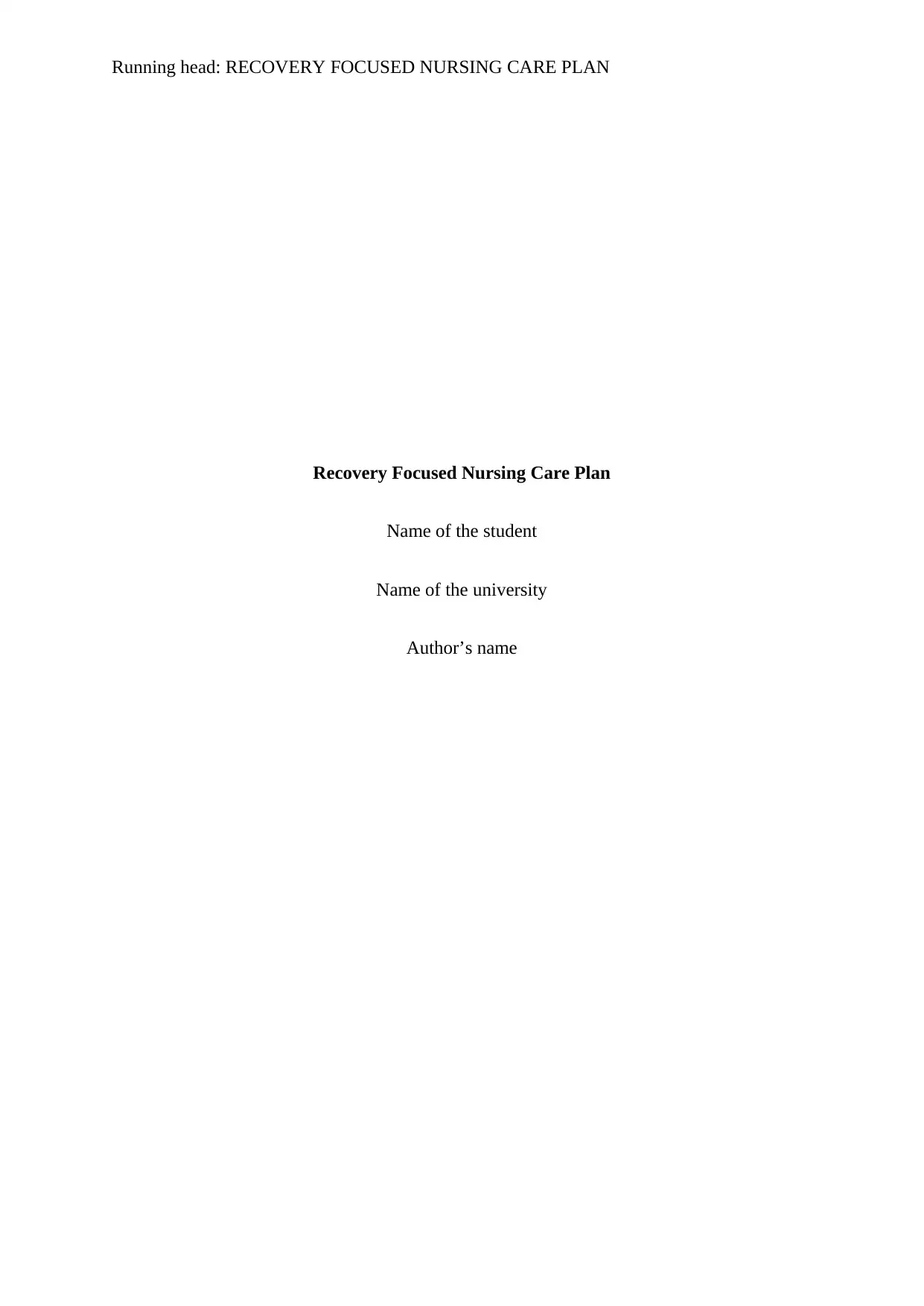
Running head: RECOVERY FOCUSED NURSING CARE PLAN
Recovery Focused Nursing Care Plan
Name of the student
Name of the university
Author’s name
Recovery Focused Nursing Care Plan
Name of the student
Name of the university
Author’s name
Secure Best Marks with AI Grader
Need help grading? Try our AI Grader for instant feedback on your assignments.
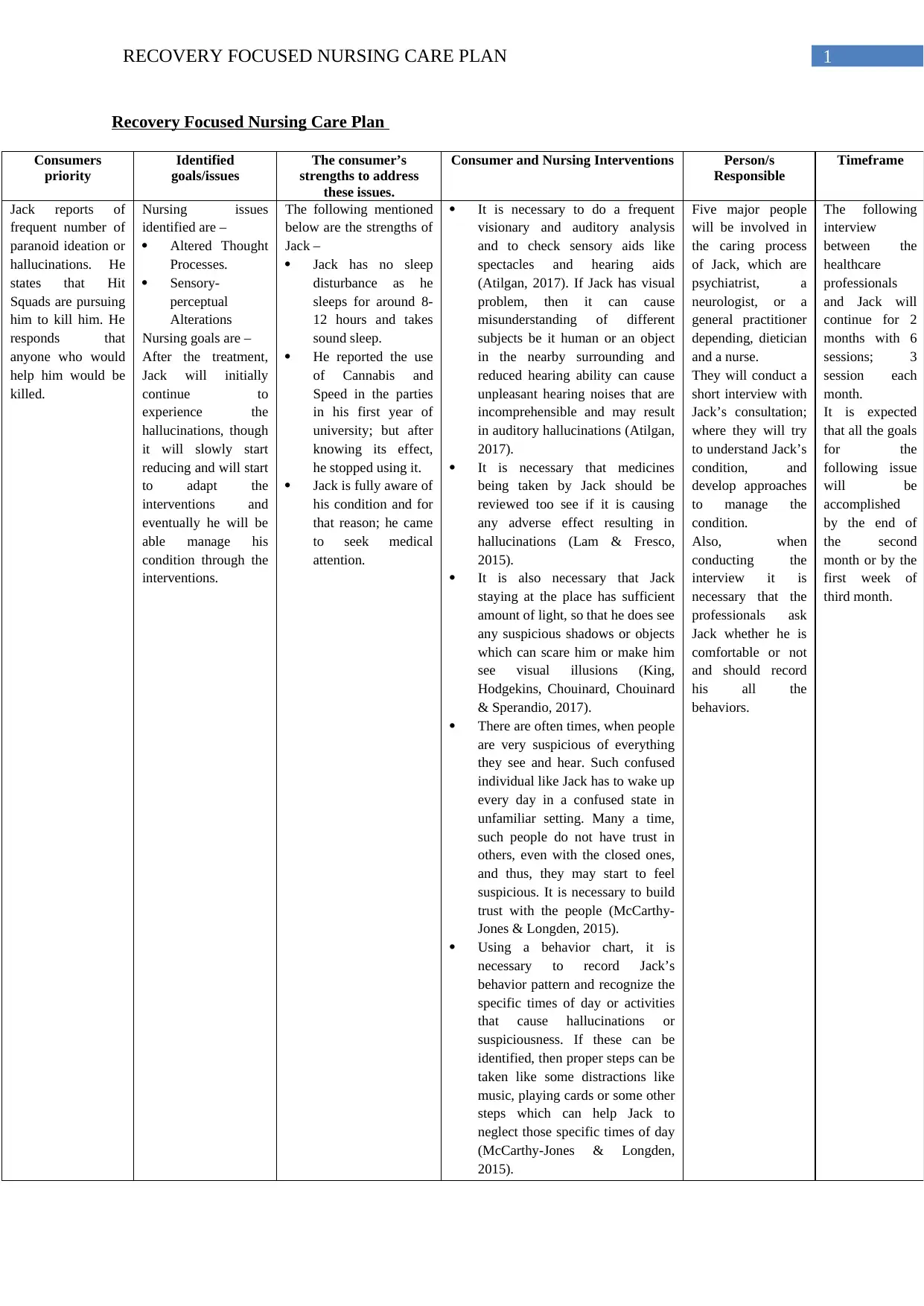
1RECOVERY FOCUSED NURSING CARE PLAN
Recovery Focused Nursing Care Plan
Consumers
priority
Identified
goals/issues
The consumer’s
strengths to address
these issues.
Consumer and Nursing Interventions Person/s
Responsible
Timeframe
Jack reports of
frequent number of
paranoid ideation or
hallucinations. He
states that Hit
Squads are pursuing
him to kill him. He
responds that
anyone who would
help him would be
killed.
Nursing issues
identified are –
Altered Thought
Processes.
Sensory-
perceptual
Alterations
Nursing goals are –
After the treatment,
Jack will initially
continue to
experience the
hallucinations, though
it will slowly start
reducing and will start
to adapt the
interventions and
eventually he will be
able manage his
condition through the
interventions.
The following mentioned
below are the strengths of
Jack –
Jack has no sleep
disturbance as he
sleeps for around 8-
12 hours and takes
sound sleep.
He reported the use
of Cannabis and
Speed in the parties
in his first year of
university; but after
knowing its effect,
he stopped using it.
Jack is fully aware of
his condition and for
that reason; he came
to seek medical
attention.
It is necessary to do a frequent
visionary and auditory analysis
and to check sensory aids like
spectacles and hearing aids
(Atilgan, 2017). If Jack has visual
problem, then it can cause
misunderstanding of different
subjects be it human or an object
in the nearby surrounding and
reduced hearing ability can cause
unpleasant hearing noises that are
incomprehensible and may result
in auditory hallucinations (Atilgan,
2017).
It is necessary that medicines
being taken by Jack should be
reviewed too see if it is causing
any adverse effect resulting in
hallucinations (Lam & Fresco,
2015).
It is also necessary that Jack
staying at the place has sufficient
amount of light, so that he does see
any suspicious shadows or objects
which can scare him or make him
see visual illusions (King,
Hodgekins, Chouinard, Chouinard
& Sperandio, 2017).
There are often times, when people
are very suspicious of everything
they see and hear. Such confused
individual like Jack has to wake up
every day in a confused state in
unfamiliar setting. Many a time,
such people do not have trust in
others, even with the closed ones,
and thus, they may start to feel
suspicious. It is necessary to build
trust with the people (McCarthy-
Jones & Longden, 2015).
Using a behavior chart, it is
necessary to record Jack’s
behavior pattern and recognize the
specific times of day or activities
that cause hallucinations or
suspiciousness. If these can be
identified, then proper steps can be
taken like some distractions like
music, playing cards or some other
steps which can help Jack to
neglect those specific times of day
(McCarthy-Jones & Longden,
2015).
Five major people
will be involved in
the caring process
of Jack, which are
psychiatrist, a
neurologist, or a
general practitioner
depending, dietician
and a nurse.
They will conduct a
short interview with
Jack’s consultation;
where they will try
to understand Jack’s
condition, and
develop approaches
to manage the
condition.
Also, when
conducting the
interview it is
necessary that the
professionals ask
Jack whether he is
comfortable or not
and should record
his all the
behaviors.
The following
interview
between the
healthcare
professionals
and Jack will
continue for 2
months with 6
sessions; 3
session each
month.
It is expected
that all the goals
for the
following issue
will be
accomplished
by the end of
the second
month or by the
first week of
third month.
Recovery Focused Nursing Care Plan
Consumers
priority
Identified
goals/issues
The consumer’s
strengths to address
these issues.
Consumer and Nursing Interventions Person/s
Responsible
Timeframe
Jack reports of
frequent number of
paranoid ideation or
hallucinations. He
states that Hit
Squads are pursuing
him to kill him. He
responds that
anyone who would
help him would be
killed.
Nursing issues
identified are –
Altered Thought
Processes.
Sensory-
perceptual
Alterations
Nursing goals are –
After the treatment,
Jack will initially
continue to
experience the
hallucinations, though
it will slowly start
reducing and will start
to adapt the
interventions and
eventually he will be
able manage his
condition through the
interventions.
The following mentioned
below are the strengths of
Jack –
Jack has no sleep
disturbance as he
sleeps for around 8-
12 hours and takes
sound sleep.
He reported the use
of Cannabis and
Speed in the parties
in his first year of
university; but after
knowing its effect,
he stopped using it.
Jack is fully aware of
his condition and for
that reason; he came
to seek medical
attention.
It is necessary to do a frequent
visionary and auditory analysis
and to check sensory aids like
spectacles and hearing aids
(Atilgan, 2017). If Jack has visual
problem, then it can cause
misunderstanding of different
subjects be it human or an object
in the nearby surrounding and
reduced hearing ability can cause
unpleasant hearing noises that are
incomprehensible and may result
in auditory hallucinations (Atilgan,
2017).
It is necessary that medicines
being taken by Jack should be
reviewed too see if it is causing
any adverse effect resulting in
hallucinations (Lam & Fresco,
2015).
It is also necessary that Jack
staying at the place has sufficient
amount of light, so that he does see
any suspicious shadows or objects
which can scare him or make him
see visual illusions (King,
Hodgekins, Chouinard, Chouinard
& Sperandio, 2017).
There are often times, when people
are very suspicious of everything
they see and hear. Such confused
individual like Jack has to wake up
every day in a confused state in
unfamiliar setting. Many a time,
such people do not have trust in
others, even with the closed ones,
and thus, they may start to feel
suspicious. It is necessary to build
trust with the people (McCarthy-
Jones & Longden, 2015).
Using a behavior chart, it is
necessary to record Jack’s
behavior pattern and recognize the
specific times of day or activities
that cause hallucinations or
suspiciousness. If these can be
identified, then proper steps can be
taken like some distractions like
music, playing cards or some other
steps which can help Jack to
neglect those specific times of day
(McCarthy-Jones & Longden,
2015).
Five major people
will be involved in
the caring process
of Jack, which are
psychiatrist, a
neurologist, or a
general practitioner
depending, dietician
and a nurse.
They will conduct a
short interview with
Jack’s consultation;
where they will try
to understand Jack’s
condition, and
develop approaches
to manage the
condition.
Also, when
conducting the
interview it is
necessary that the
professionals ask
Jack whether he is
comfortable or not
and should record
his all the
behaviors.
The following
interview
between the
healthcare
professionals
and Jack will
continue for 2
months with 6
sessions; 3
session each
month.
It is expected
that all the goals
for the
following issue
will be
accomplished
by the end of
the second
month or by the
first week of
third month.
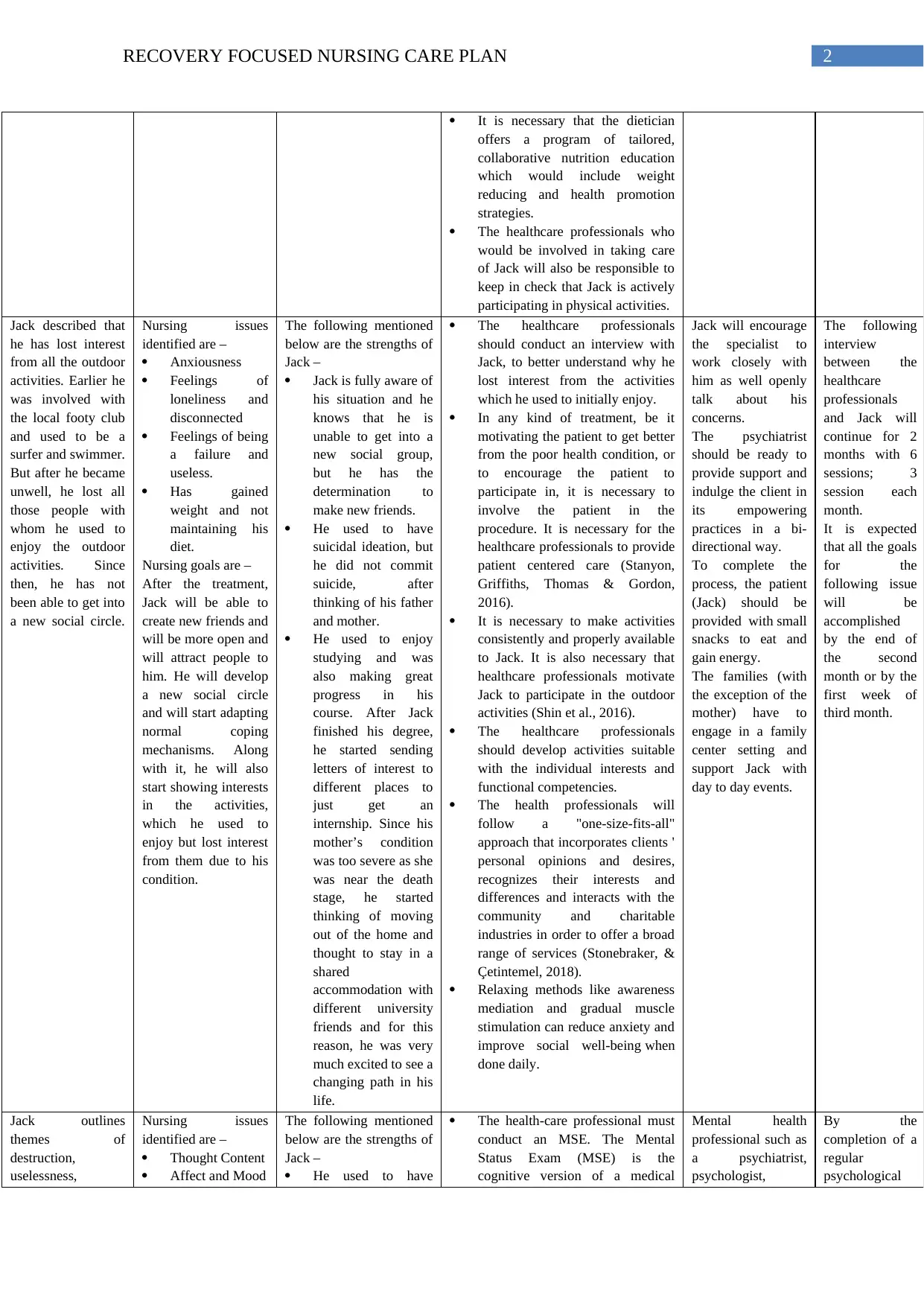
2RECOVERY FOCUSED NURSING CARE PLAN
It is necessary that the dietician
offers a program of tailored,
collaborative nutrition education
which would include weight
reducing and health promotion
strategies.
The healthcare professionals who
would be involved in taking care
of Jack will also be responsible to
keep in check that Jack is actively
participating in physical activities.
Jack described that
he has lost interest
from all the outdoor
activities. Earlier he
was involved with
the local footy club
and used to be a
surfer and swimmer.
But after he became
unwell, he lost all
those people with
whom he used to
enjoy the outdoor
activities. Since
then, he has not
been able to get into
a new social circle.
Nursing issues
identified are –
Anxiousness
Feelings of
loneliness and
disconnected
Feelings of being
a failure and
useless.
Has gained
weight and not
maintaining his
diet.
Nursing goals are –
After the treatment,
Jack will be able to
create new friends and
will be more open and
will attract people to
him. He will develop
a new social circle
and will start adapting
normal coping
mechanisms. Along
with it, he will also
start showing interests
in the activities,
which he used to
enjoy but lost interest
from them due to his
condition.
The following mentioned
below are the strengths of
Jack –
Jack is fully aware of
his situation and he
knows that he is
unable to get into a
new social group,
but he has the
determination to
make new friends.
He used to have
suicidal ideation, but
he did not commit
suicide, after
thinking of his father
and mother.
He used to enjoy
studying and was
also making great
progress in his
course. After Jack
finished his degree,
he started sending
letters of interest to
different places to
just get an
internship. Since his
mother’s condition
was too severe as she
was near the death
stage, he started
thinking of moving
out of the home and
thought to stay in a
shared
accommodation with
different university
friends and for this
reason, he was very
much excited to see a
changing path in his
life.
The healthcare professionals
should conduct an interview with
Jack, to better understand why he
lost interest from the activities
which he used to initially enjoy.
In any kind of treatment, be it
motivating the patient to get better
from the poor health condition, or
to encourage the patient to
participate in, it is necessary to
involve the patient in the
procedure. It is necessary for the
healthcare professionals to provide
patient centered care (Stanyon,
Griffiths, Thomas & Gordon,
2016).
It is necessary to make activities
consistently and properly available
to Jack. It is also necessary that
healthcare professionals motivate
Jack to participate in the outdoor
activities (Shin et al., 2016).
The healthcare professionals
should develop activities suitable
with the individual interests and
functional competencies.
The health professionals will
follow a "one-size-fits-all"
approach that incorporates clients '
personal opinions and desires,
recognizes their interests and
differences and interacts with the
community and charitable
industries in order to offer a broad
range of services (Stonebraker, &
Çetintemel, 2018).
Relaxing methods like awareness
mediation and gradual muscle
stimulation can reduce anxiety and
improve social well-being when
done daily.
Jack will encourage
the specialist to
work closely with
him as well openly
talk about his
concerns.
The psychiatrist
should be ready to
provide support and
indulge the client in
its empowering
practices in a bi-
directional way.
To complete the
process, the patient
(Jack) should be
provided with small
snacks to eat and
gain energy.
The families (with
the exception of the
mother) have to
engage in a family
center setting and
support Jack with
day to day events.
The following
interview
between the
healthcare
professionals
and Jack will
continue for 2
months with 6
sessions; 3
session each
month.
It is expected
that all the goals
for the
following issue
will be
accomplished
by the end of
the second
month or by the
first week of
third month.
Jack outlines
themes of
destruction,
uselessness,
Nursing issues
identified are –
Thought Content
Affect and Mood
The following mentioned
below are the strengths of
Jack –
He used to have
The health-care professional must
conduct an MSE. The Mental
Status Exam (MSE) is the
cognitive version of a medical
Mental health
professional such as
a psychiatrist,
psychologist,
By the
completion of a
regular
psychological
It is necessary that the dietician
offers a program of tailored,
collaborative nutrition education
which would include weight
reducing and health promotion
strategies.
The healthcare professionals who
would be involved in taking care
of Jack will also be responsible to
keep in check that Jack is actively
participating in physical activities.
Jack described that
he has lost interest
from all the outdoor
activities. Earlier he
was involved with
the local footy club
and used to be a
surfer and swimmer.
But after he became
unwell, he lost all
those people with
whom he used to
enjoy the outdoor
activities. Since
then, he has not
been able to get into
a new social circle.
Nursing issues
identified are –
Anxiousness
Feelings of
loneliness and
disconnected
Feelings of being
a failure and
useless.
Has gained
weight and not
maintaining his
diet.
Nursing goals are –
After the treatment,
Jack will be able to
create new friends and
will be more open and
will attract people to
him. He will develop
a new social circle
and will start adapting
normal coping
mechanisms. Along
with it, he will also
start showing interests
in the activities,
which he used to
enjoy but lost interest
from them due to his
condition.
The following mentioned
below are the strengths of
Jack –
Jack is fully aware of
his situation and he
knows that he is
unable to get into a
new social group,
but he has the
determination to
make new friends.
He used to have
suicidal ideation, but
he did not commit
suicide, after
thinking of his father
and mother.
He used to enjoy
studying and was
also making great
progress in his
course. After Jack
finished his degree,
he started sending
letters of interest to
different places to
just get an
internship. Since his
mother’s condition
was too severe as she
was near the death
stage, he started
thinking of moving
out of the home and
thought to stay in a
shared
accommodation with
different university
friends and for this
reason, he was very
much excited to see a
changing path in his
life.
The healthcare professionals
should conduct an interview with
Jack, to better understand why he
lost interest from the activities
which he used to initially enjoy.
In any kind of treatment, be it
motivating the patient to get better
from the poor health condition, or
to encourage the patient to
participate in, it is necessary to
involve the patient in the
procedure. It is necessary for the
healthcare professionals to provide
patient centered care (Stanyon,
Griffiths, Thomas & Gordon,
2016).
It is necessary to make activities
consistently and properly available
to Jack. It is also necessary that
healthcare professionals motivate
Jack to participate in the outdoor
activities (Shin et al., 2016).
The healthcare professionals
should develop activities suitable
with the individual interests and
functional competencies.
The health professionals will
follow a "one-size-fits-all"
approach that incorporates clients '
personal opinions and desires,
recognizes their interests and
differences and interacts with the
community and charitable
industries in order to offer a broad
range of services (Stonebraker, &
Çetintemel, 2018).
Relaxing methods like awareness
mediation and gradual muscle
stimulation can reduce anxiety and
improve social well-being when
done daily.
Jack will encourage
the specialist to
work closely with
him as well openly
talk about his
concerns.
The psychiatrist
should be ready to
provide support and
indulge the client in
its empowering
practices in a bi-
directional way.
To complete the
process, the patient
(Jack) should be
provided with small
snacks to eat and
gain energy.
The families (with
the exception of the
mother) have to
engage in a family
center setting and
support Jack with
day to day events.
The following
interview
between the
healthcare
professionals
and Jack will
continue for 2
months with 6
sessions; 3
session each
month.
It is expected
that all the goals
for the
following issue
will be
accomplished
by the end of
the second
month or by the
first week of
third month.
Jack outlines
themes of
destruction,
uselessness,
Nursing issues
identified are –
Thought Content
Affect and Mood
The following mentioned
below are the strengths of
Jack –
He used to have
The health-care professional must
conduct an MSE. The Mental
Status Exam (MSE) is the
cognitive version of a medical
Mental health
professional such as
a psychiatrist,
psychologist,
By the
completion of a
regular
psychological
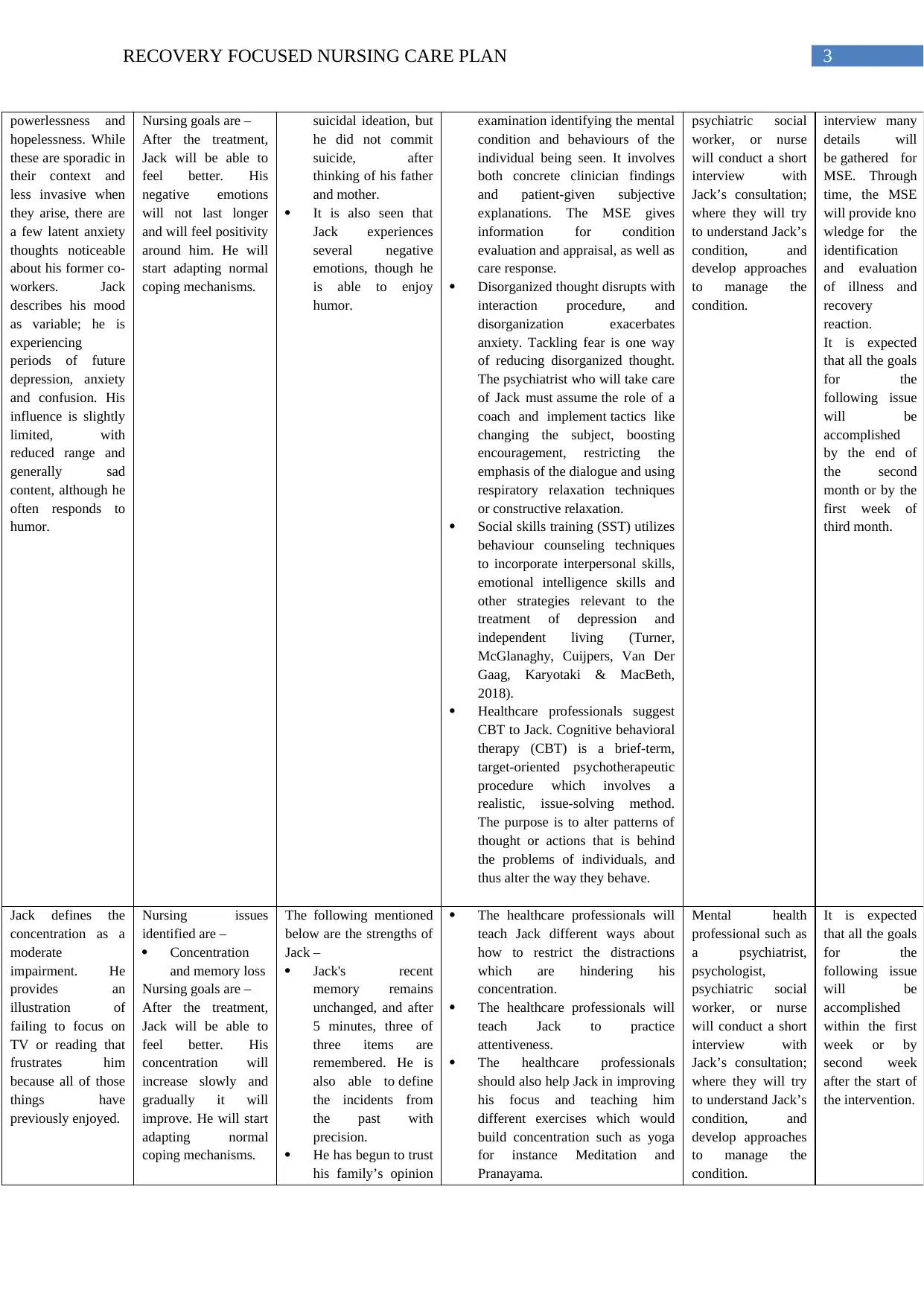
3RECOVERY FOCUSED NURSING CARE PLAN
powerlessness and
hopelessness. While
these are sporadic in
their context and
less invasive when
they arise, there are
a few latent anxiety
thoughts noticeable
about his former co-
workers. Jack
describes his mood
as variable; he is
experiencing
periods of future
depression, anxiety
and confusion. His
influence is slightly
limited, with
reduced range and
generally sad
content, although he
often responds to
humor.
Nursing goals are –
After the treatment,
Jack will be able to
feel better. His
negative emotions
will not last longer
and will feel positivity
around him. He will
start adapting normal
coping mechanisms.
suicidal ideation, but
he did not commit
suicide, after
thinking of his father
and mother.
It is also seen that
Jack experiences
several negative
emotions, though he
is able to enjoy
humor.
examination identifying the mental
condition and behaviours of the
individual being seen. It involves
both concrete clinician findings
and patient-given subjective
explanations. The MSE gives
information for condition
evaluation and appraisal, as well as
care response.
Disorganized thought disrupts with
interaction procedure, and
disorganization exacerbates
anxiety. Tackling fear is one way
of reducing disorganized thought.
The psychiatrist who will take care
of Jack must assume the role of a
coach and implement tactics like
changing the subject, boosting
encouragement, restricting the
emphasis of the dialogue and using
respiratory relaxation techniques
or constructive relaxation.
Social skills training (SST) utilizes
behaviour counseling techniques
to incorporate interpersonal skills,
emotional intelligence skills and
other strategies relevant to the
treatment of depression and
independent living (Turner,
McGlanaghy, Cuijpers, Van Der
Gaag, Karyotaki & MacBeth,
2018).
Healthcare professionals suggest
CBT to Jack. Cognitive behavioral
therapy (CBT) is a brief-term,
target-oriented psychotherapeutic
procedure which involves a
realistic, issue-solving method.
The purpose is to alter patterns of
thought or actions that is behind
the problems of individuals, and
thus alter the way they behave.
psychiatric social
worker, or nurse
will conduct a short
interview with
Jack’s consultation;
where they will try
to understand Jack’s
condition, and
develop approaches
to manage the
condition.
interview many
details will
be gathered for
MSE. Through
time, the MSE
will provide kno
wledge for the
identification
and evaluation
of illness and
recovery
reaction.
It is expected
that all the goals
for the
following issue
will be
accomplished
by the end of
the second
month or by the
first week of
third month.
Jack defines the
concentration as a
moderate
impairment. He
provides an
illustration of
failing to focus on
TV or reading that
frustrates him
because all of those
things have
previously enjoyed.
Nursing issues
identified are –
Concentration
and memory loss
Nursing goals are –
After the treatment,
Jack will be able to
feel better. His
concentration will
increase slowly and
gradually it will
improve. He will start
adapting normal
coping mechanisms.
The following mentioned
below are the strengths of
Jack –
Jack's recent
memory remains
unchanged, and after
5 minutes, three of
three items are
remembered. He is
also able to define
the incidents from
the past with
precision.
He has begun to trust
his family’s opinion
The healthcare professionals will
teach Jack different ways about
how to restrict the distractions
which are hindering his
concentration.
The healthcare professionals will
teach Jack to practice
attentiveness.
The healthcare professionals
should also help Jack in improving
his focus and teaching him
different exercises which would
build concentration such as yoga
for instance Meditation and
Pranayama.
Mental health
professional such as
a psychiatrist,
psychologist,
psychiatric social
worker, or nurse
will conduct a short
interview with
Jack’s consultation;
where they will try
to understand Jack’s
condition, and
develop approaches
to manage the
condition.
It is expected
that all the goals
for the
following issue
will be
accomplished
within the first
week or by
second week
after the start of
the intervention.
powerlessness and
hopelessness. While
these are sporadic in
their context and
less invasive when
they arise, there are
a few latent anxiety
thoughts noticeable
about his former co-
workers. Jack
describes his mood
as variable; he is
experiencing
periods of future
depression, anxiety
and confusion. His
influence is slightly
limited, with
reduced range and
generally sad
content, although he
often responds to
humor.
Nursing goals are –
After the treatment,
Jack will be able to
feel better. His
negative emotions
will not last longer
and will feel positivity
around him. He will
start adapting normal
coping mechanisms.
suicidal ideation, but
he did not commit
suicide, after
thinking of his father
and mother.
It is also seen that
Jack experiences
several negative
emotions, though he
is able to enjoy
humor.
examination identifying the mental
condition and behaviours of the
individual being seen. It involves
both concrete clinician findings
and patient-given subjective
explanations. The MSE gives
information for condition
evaluation and appraisal, as well as
care response.
Disorganized thought disrupts with
interaction procedure, and
disorganization exacerbates
anxiety. Tackling fear is one way
of reducing disorganized thought.
The psychiatrist who will take care
of Jack must assume the role of a
coach and implement tactics like
changing the subject, boosting
encouragement, restricting the
emphasis of the dialogue and using
respiratory relaxation techniques
or constructive relaxation.
Social skills training (SST) utilizes
behaviour counseling techniques
to incorporate interpersonal skills,
emotional intelligence skills and
other strategies relevant to the
treatment of depression and
independent living (Turner,
McGlanaghy, Cuijpers, Van Der
Gaag, Karyotaki & MacBeth,
2018).
Healthcare professionals suggest
CBT to Jack. Cognitive behavioral
therapy (CBT) is a brief-term,
target-oriented psychotherapeutic
procedure which involves a
realistic, issue-solving method.
The purpose is to alter patterns of
thought or actions that is behind
the problems of individuals, and
thus alter the way they behave.
psychiatric social
worker, or nurse
will conduct a short
interview with
Jack’s consultation;
where they will try
to understand Jack’s
condition, and
develop approaches
to manage the
condition.
interview many
details will
be gathered for
MSE. Through
time, the MSE
will provide kno
wledge for the
identification
and evaluation
of illness and
recovery
reaction.
It is expected
that all the goals
for the
following issue
will be
accomplished
by the end of
the second
month or by the
first week of
third month.
Jack defines the
concentration as a
moderate
impairment. He
provides an
illustration of
failing to focus on
TV or reading that
frustrates him
because all of those
things have
previously enjoyed.
Nursing issues
identified are –
Concentration
and memory loss
Nursing goals are –
After the treatment,
Jack will be able to
feel better. His
concentration will
increase slowly and
gradually it will
improve. He will start
adapting normal
coping mechanisms.
The following mentioned
below are the strengths of
Jack –
Jack's recent
memory remains
unchanged, and after
5 minutes, three of
three items are
remembered. He is
also able to define
the incidents from
the past with
precision.
He has begun to trust
his family’s opinion
The healthcare professionals will
teach Jack different ways about
how to restrict the distractions
which are hindering his
concentration.
The healthcare professionals will
teach Jack to practice
attentiveness.
The healthcare professionals
should also help Jack in improving
his focus and teaching him
different exercises which would
build concentration such as yoga
for instance Meditation and
Pranayama.
Mental health
professional such as
a psychiatrist,
psychologist,
psychiatric social
worker, or nurse
will conduct a short
interview with
Jack’s consultation;
where they will try
to understand Jack’s
condition, and
develop approaches
to manage the
condition.
It is expected
that all the goals
for the
following issue
will be
accomplished
within the first
week or by
second week
after the start of
the intervention.
Secure Best Marks with AI Grader
Need help grading? Try our AI Grader for instant feedback on your assignments.
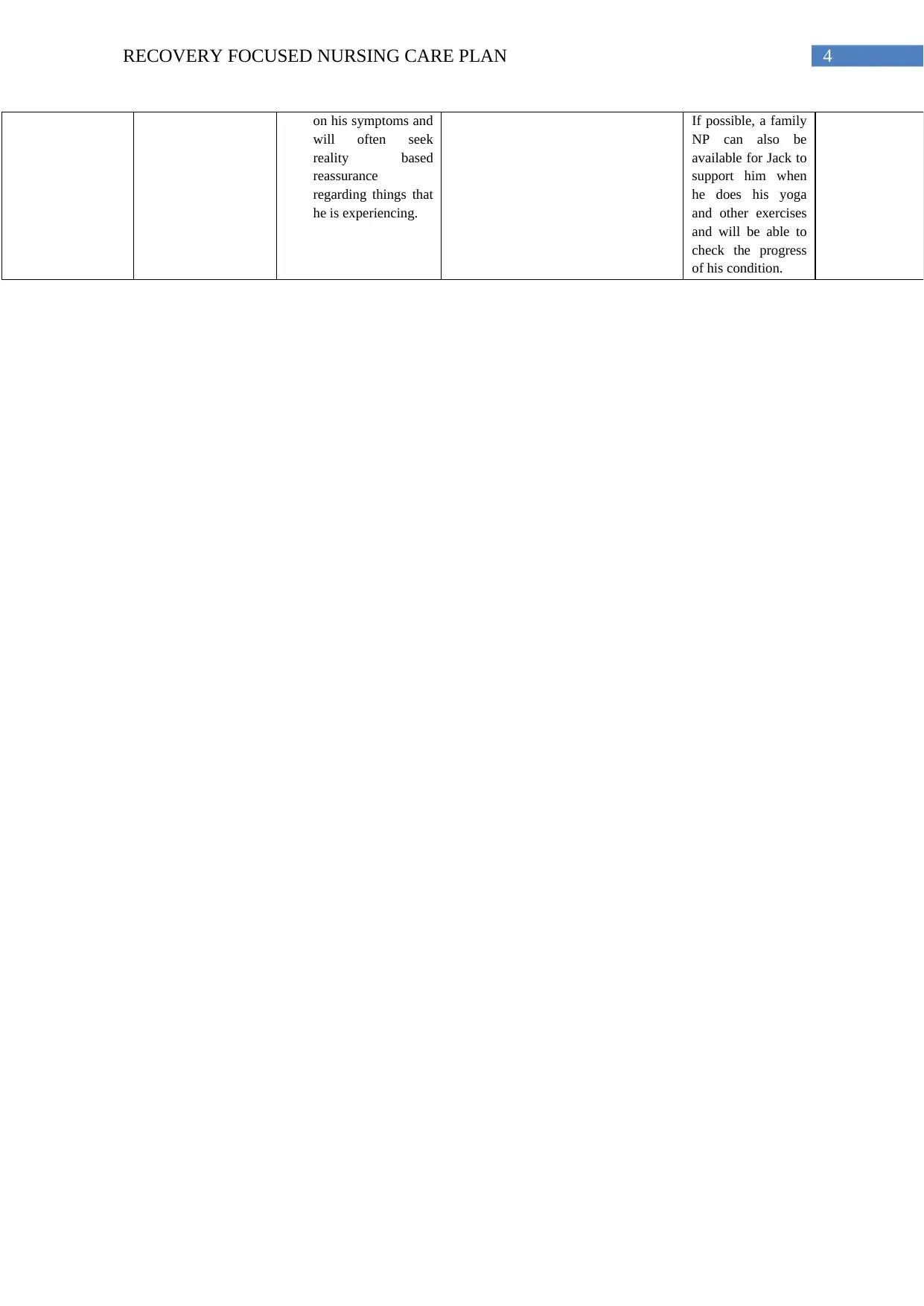
4RECOVERY FOCUSED NURSING CARE PLAN
on his symptoms and
will often seek
reality based
reassurance
regarding things that
he is experiencing.
If possible, a family
NP can also be
available for Jack to
support him when
he does his yoga
and other exercises
and will be able to
check the progress
of his condition.
on his symptoms and
will often seek
reality based
reassurance
regarding things that
he is experiencing.
If possible, a family
NP can also be
available for Jack to
support him when
he does his yoga
and other exercises
and will be able to
check the progress
of his condition.
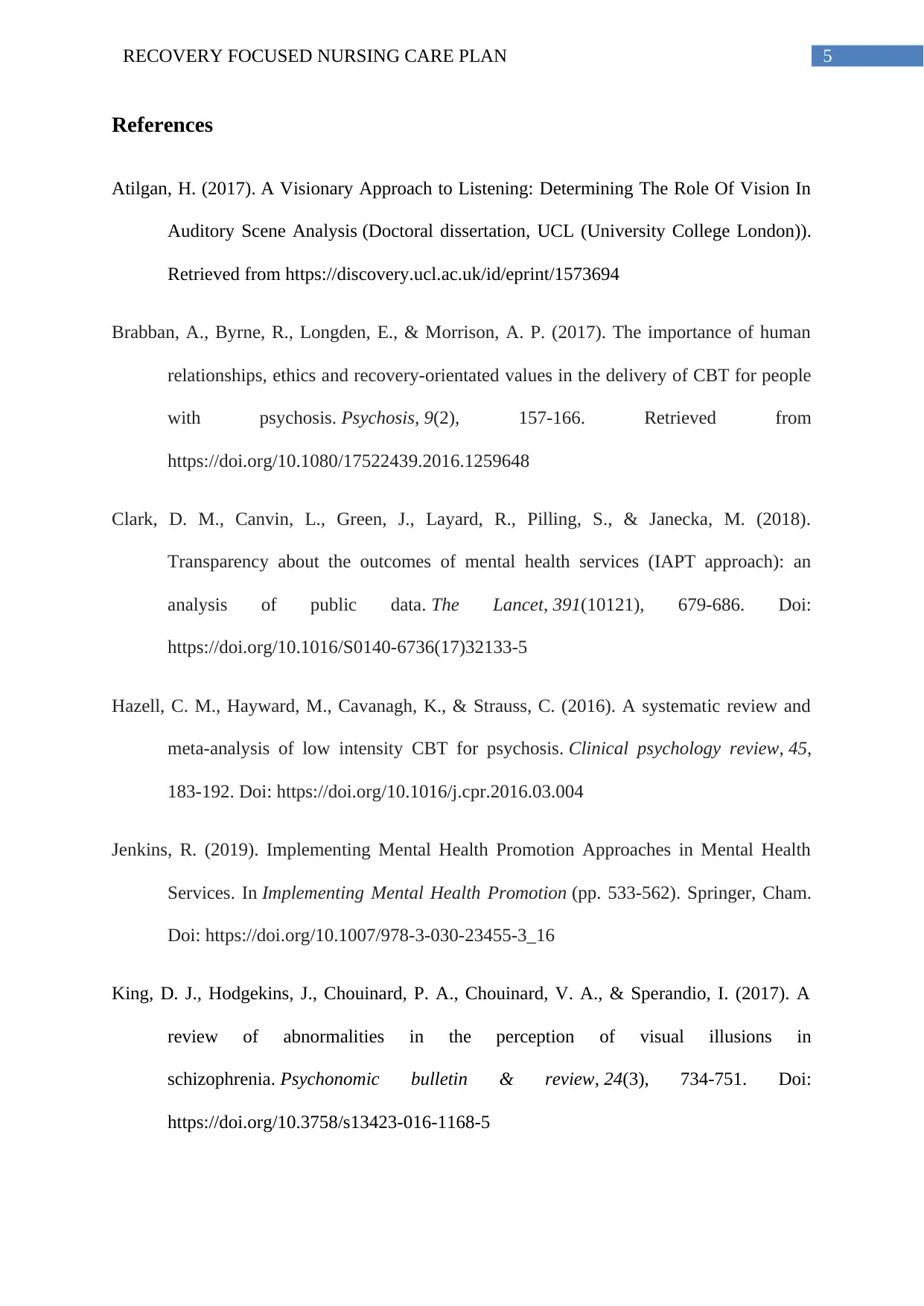
5RECOVERY FOCUSED NURSING CARE PLAN
References
Atilgan, H. (2017). A Visionary Approach to Listening: Determining The Role Of Vision In
Auditory Scene Analysis (Doctoral dissertation, UCL (University College London)).
Retrieved from https://discovery.ucl.ac.uk/id/eprint/1573694
Brabban, A., Byrne, R., Longden, E., & Morrison, A. P. (2017). The importance of human
relationships, ethics and recovery-orientated values in the delivery of CBT for people
with psychosis. Psychosis, 9(2), 157-166. Retrieved from
https://doi.org/10.1080/17522439.2016.1259648
Clark, D. M., Canvin, L., Green, J., Layard, R., Pilling, S., & Janecka, M. (2018).
Transparency about the outcomes of mental health services (IAPT approach): an
analysis of public data. The Lancet, 391(10121), 679-686. Doi:
https://doi.org/10.1016/S0140-6736(17)32133-5
Hazell, C. M., Hayward, M., Cavanagh, K., & Strauss, C. (2016). A systematic review and
meta-analysis of low intensity CBT for psychosis. Clinical psychology review, 45,
183-192. Doi: https://doi.org/10.1016/j.cpr.2016.03.004
Jenkins, R. (2019). Implementing Mental Health Promotion Approaches in Mental Health
Services. In Implementing Mental Health Promotion (pp. 533-562). Springer, Cham.
Doi: https://doi.org/10.1007/978-3-030-23455-3_16
King, D. J., Hodgekins, J., Chouinard, P. A., Chouinard, V. A., & Sperandio, I. (2017). A
review of abnormalities in the perception of visual illusions in
schizophrenia. Psychonomic bulletin & review, 24(3), 734-751. Doi:
https://doi.org/10.3758/s13423-016-1168-5
References
Atilgan, H. (2017). A Visionary Approach to Listening: Determining The Role Of Vision In
Auditory Scene Analysis (Doctoral dissertation, UCL (University College London)).
Retrieved from https://discovery.ucl.ac.uk/id/eprint/1573694
Brabban, A., Byrne, R., Longden, E., & Morrison, A. P. (2017). The importance of human
relationships, ethics and recovery-orientated values in the delivery of CBT for people
with psychosis. Psychosis, 9(2), 157-166. Retrieved from
https://doi.org/10.1080/17522439.2016.1259648
Clark, D. M., Canvin, L., Green, J., Layard, R., Pilling, S., & Janecka, M. (2018).
Transparency about the outcomes of mental health services (IAPT approach): an
analysis of public data. The Lancet, 391(10121), 679-686. Doi:
https://doi.org/10.1016/S0140-6736(17)32133-5
Hazell, C. M., Hayward, M., Cavanagh, K., & Strauss, C. (2016). A systematic review and
meta-analysis of low intensity CBT for psychosis. Clinical psychology review, 45,
183-192. Doi: https://doi.org/10.1016/j.cpr.2016.03.004
Jenkins, R. (2019). Implementing Mental Health Promotion Approaches in Mental Health
Services. In Implementing Mental Health Promotion (pp. 533-562). Springer, Cham.
Doi: https://doi.org/10.1007/978-3-030-23455-3_16
King, D. J., Hodgekins, J., Chouinard, P. A., Chouinard, V. A., & Sperandio, I. (2017). A
review of abnormalities in the perception of visual illusions in
schizophrenia. Psychonomic bulletin & review, 24(3), 734-751. Doi:
https://doi.org/10.3758/s13423-016-1168-5
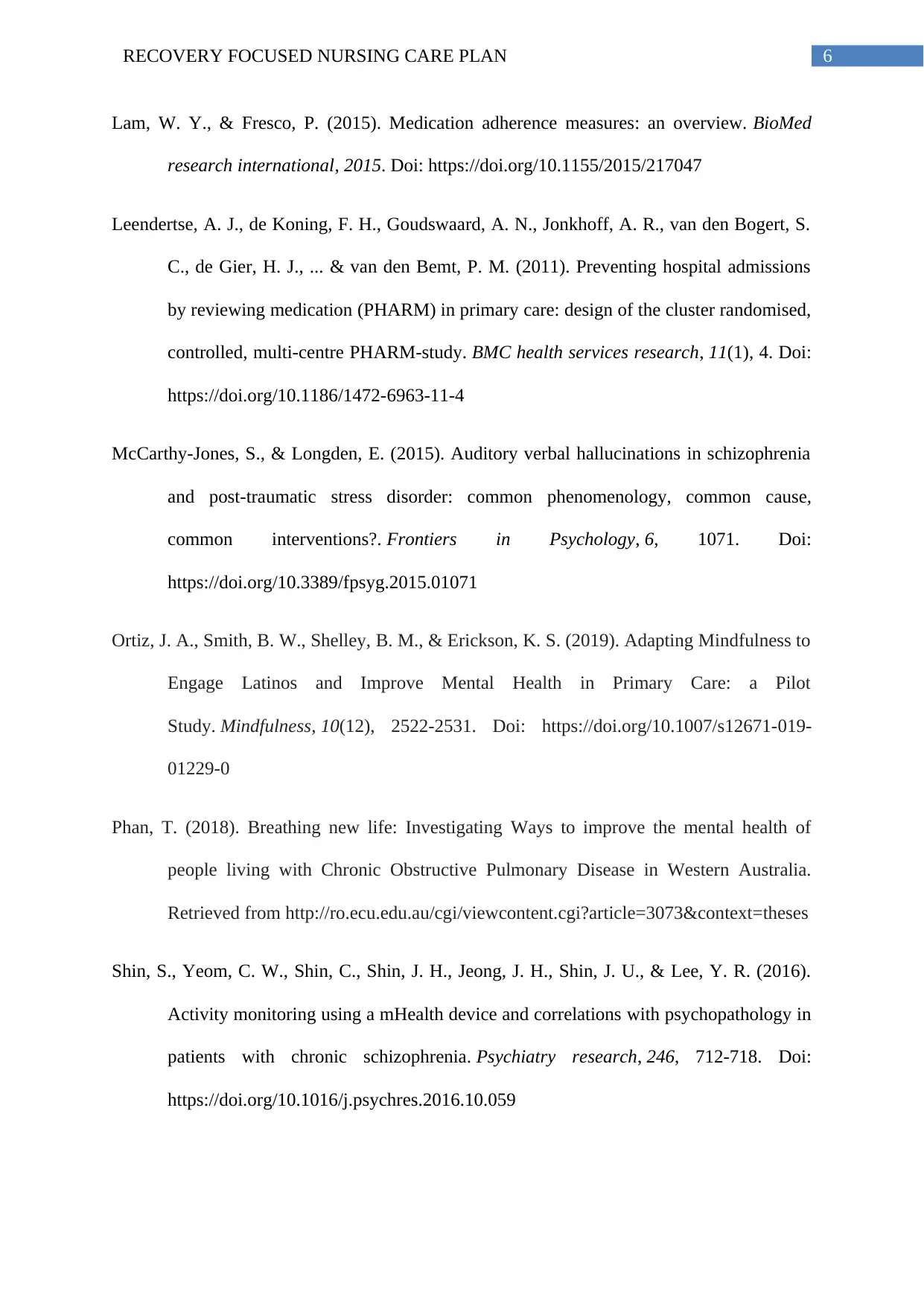
6RECOVERY FOCUSED NURSING CARE PLAN
Lam, W. Y., & Fresco, P. (2015). Medication adherence measures: an overview. BioMed
research international, 2015. Doi: https://doi.org/10.1155/2015/217047
Leendertse, A. J., de Koning, F. H., Goudswaard, A. N., Jonkhoff, A. R., van den Bogert, S.
C., de Gier, H. J., ... & van den Bemt, P. M. (2011). Preventing hospital admissions
by reviewing medication (PHARM) in primary care: design of the cluster randomised,
controlled, multi-centre PHARM-study. BMC health services research, 11(1), 4. Doi:
https://doi.org/10.1186/1472-6963-11-4
McCarthy-Jones, S., & Longden, E. (2015). Auditory verbal hallucinations in schizophrenia
and post-traumatic stress disorder: common phenomenology, common cause,
common interventions?. Frontiers in Psychology, 6, 1071. Doi:
https://doi.org/10.3389/fpsyg.2015.01071
Ortiz, J. A., Smith, B. W., Shelley, B. M., & Erickson, K. S. (2019). Adapting Mindfulness to
Engage Latinos and Improve Mental Health in Primary Care: a Pilot
Study. Mindfulness, 10(12), 2522-2531. Doi: https://doi.org/10.1007/s12671-019-
01229-0
Phan, T. (2018). Breathing new life: Investigating Ways to improve the mental health of
people living with Chronic Obstructive Pulmonary Disease in Western Australia.
Retrieved from http://ro.ecu.edu.au/cgi/viewcontent.cgi?article=3073&context=theses
Shin, S., Yeom, C. W., Shin, C., Shin, J. H., Jeong, J. H., Shin, J. U., & Lee, Y. R. (2016).
Activity monitoring using a mHealth device and correlations with psychopathology in
patients with chronic schizophrenia. Psychiatry research, 246, 712-718. Doi:
https://doi.org/10.1016/j.psychres.2016.10.059
Lam, W. Y., & Fresco, P. (2015). Medication adherence measures: an overview. BioMed
research international, 2015. Doi: https://doi.org/10.1155/2015/217047
Leendertse, A. J., de Koning, F. H., Goudswaard, A. N., Jonkhoff, A. R., van den Bogert, S.
C., de Gier, H. J., ... & van den Bemt, P. M. (2011). Preventing hospital admissions
by reviewing medication (PHARM) in primary care: design of the cluster randomised,
controlled, multi-centre PHARM-study. BMC health services research, 11(1), 4. Doi:
https://doi.org/10.1186/1472-6963-11-4
McCarthy-Jones, S., & Longden, E. (2015). Auditory verbal hallucinations in schizophrenia
and post-traumatic stress disorder: common phenomenology, common cause,
common interventions?. Frontiers in Psychology, 6, 1071. Doi:
https://doi.org/10.3389/fpsyg.2015.01071
Ortiz, J. A., Smith, B. W., Shelley, B. M., & Erickson, K. S. (2019). Adapting Mindfulness to
Engage Latinos and Improve Mental Health in Primary Care: a Pilot
Study. Mindfulness, 10(12), 2522-2531. Doi: https://doi.org/10.1007/s12671-019-
01229-0
Phan, T. (2018). Breathing new life: Investigating Ways to improve the mental health of
people living with Chronic Obstructive Pulmonary Disease in Western Australia.
Retrieved from http://ro.ecu.edu.au/cgi/viewcontent.cgi?article=3073&context=theses
Shin, S., Yeom, C. W., Shin, C., Shin, J. H., Jeong, J. H., Shin, J. U., & Lee, Y. R. (2016).
Activity monitoring using a mHealth device and correlations with psychopathology in
patients with chronic schizophrenia. Psychiatry research, 246, 712-718. Doi:
https://doi.org/10.1016/j.psychres.2016.10.059
Paraphrase This Document
Need a fresh take? Get an instant paraphrase of this document with our AI Paraphraser
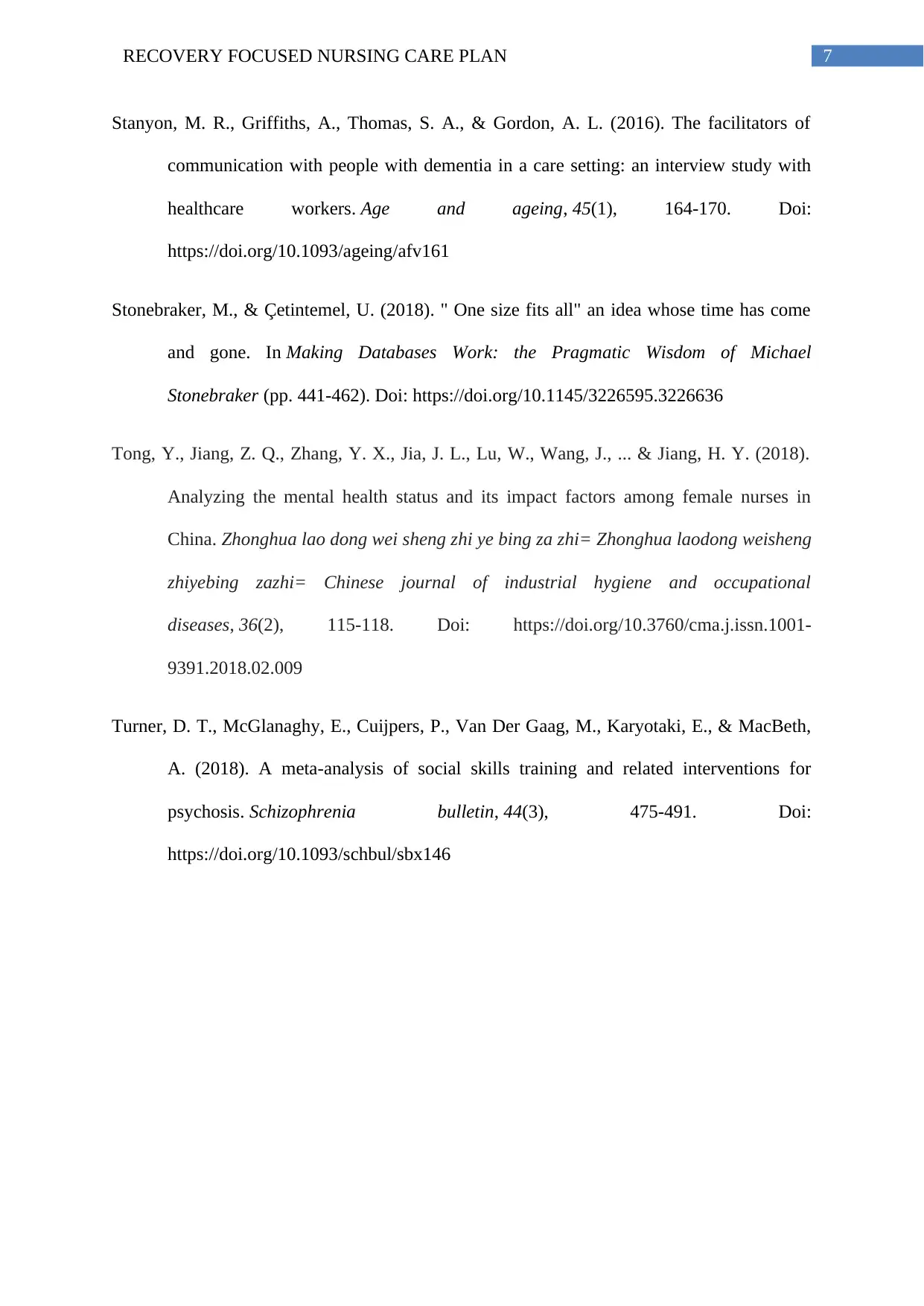
7RECOVERY FOCUSED NURSING CARE PLAN
Stanyon, M. R., Griffiths, A., Thomas, S. A., & Gordon, A. L. (2016). The facilitators of
communication with people with dementia in a care setting: an interview study with
healthcare workers. Age and ageing, 45(1), 164-170. Doi:
https://doi.org/10.1093/ageing/afv161
Stonebraker, M., & Çetintemel, U. (2018). " One size fits all" an idea whose time has come
and gone. In Making Databases Work: the Pragmatic Wisdom of Michael
Stonebraker (pp. 441-462). Doi: https://doi.org/10.1145/3226595.3226636
Tong, Y., Jiang, Z. Q., Zhang, Y. X., Jia, J. L., Lu, W., Wang, J., ... & Jiang, H. Y. (2018).
Analyzing the mental health status and its impact factors among female nurses in
China. Zhonghua lao dong wei sheng zhi ye bing za zhi= Zhonghua laodong weisheng
zhiyebing zazhi= Chinese journal of industrial hygiene and occupational
diseases, 36(2), 115-118. Doi: https://doi.org/10.3760/cma.j.issn.1001-
9391.2018.02.009
Turner, D. T., McGlanaghy, E., Cuijpers, P., Van Der Gaag, M., Karyotaki, E., & MacBeth,
A. (2018). A meta-analysis of social skills training and related interventions for
psychosis. Schizophrenia bulletin, 44(3), 475-491. Doi:
https://doi.org/10.1093/schbul/sbx146
Stanyon, M. R., Griffiths, A., Thomas, S. A., & Gordon, A. L. (2016). The facilitators of
communication with people with dementia in a care setting: an interview study with
healthcare workers. Age and ageing, 45(1), 164-170. Doi:
https://doi.org/10.1093/ageing/afv161
Stonebraker, M., & Çetintemel, U. (2018). " One size fits all" an idea whose time has come
and gone. In Making Databases Work: the Pragmatic Wisdom of Michael
Stonebraker (pp. 441-462). Doi: https://doi.org/10.1145/3226595.3226636
Tong, Y., Jiang, Z. Q., Zhang, Y. X., Jia, J. L., Lu, W., Wang, J., ... & Jiang, H. Y. (2018).
Analyzing the mental health status and its impact factors among female nurses in
China. Zhonghua lao dong wei sheng zhi ye bing za zhi= Zhonghua laodong weisheng
zhiyebing zazhi= Chinese journal of industrial hygiene and occupational
diseases, 36(2), 115-118. Doi: https://doi.org/10.3760/cma.j.issn.1001-
9391.2018.02.009
Turner, D. T., McGlanaghy, E., Cuijpers, P., Van Der Gaag, M., Karyotaki, E., & MacBeth,
A. (2018). A meta-analysis of social skills training and related interventions for
psychosis. Schizophrenia bulletin, 44(3), 475-491. Doi:
https://doi.org/10.1093/schbul/sbx146
1 out of 8
Your All-in-One AI-Powered Toolkit for Academic Success.
+13062052269
info@desklib.com
Available 24*7 on WhatsApp / Email
![[object Object]](/_next/static/media/star-bottom.7253800d.svg)
Unlock your academic potential
© 2024 | Zucol Services PVT LTD | All rights reserved.


